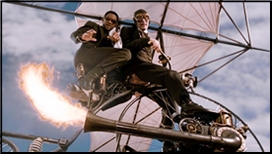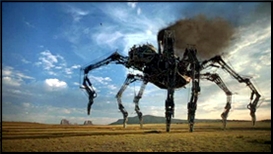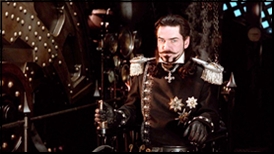Mon 13 Dec 2021
A Movie Review by David Friend: WILD WILD WEST (1999).
Posted by Steve under Action Adventure movies , Reviews , Western movies[14] Comments
WILD WILD WEST. Warner Brothers, 1999. Will Smith (James West), Kevin Kline (Artemus Gordon), Kenneth Branagh (Dr. Arliss Loveless), Salma Hayek, M. Emmet Walsh, Ted Levine. Loosely adapted from The Wild Wild West, a 1960s television series created by Michael Garrison. Director: Barry Sonnenfeld.

Soon after the American Civil War, impulsive Army Captain Jim West (Will Smith) sets out to find his parents’ killer: the bitterly ruthless ex-Confederate General ‘Bloodbath’ McGrath (Ted Levine). The trail leads to a West Virginia brothel where the blundering intervention of undercover U.S. Marshal Artemus Gordon (Kevin Kline) and an accidental nitroglycerin explosion causes McGrath to escape.
The two Americans may be on the same side, but they dislike each other on sight, so neither are pleased when President Ulysses S. Grant orders them to join forces and continue the hunt for McGrath, who has kidnapped several of the country’s best scientists in a plot which could destabilise the government.
Aboard Gordon’s gadget-laden train ‘The Wanderer’, the fiercely competitive pair follow a bloody clue to the New Orleans home of Dr. Arliss Loveless (Kenneth Branagh), a legless ex-Confederate officer and ingenious engineer in a steam-powered wheelchair and decorous goatee beard. Imprisoned there is singer Rita Escobar (Salma Hayek), who claims her father is one of the captured scientists. It seems that mysterious new weapons are being manufactured, one of which they discover to be an armoured vehicle – what we would now recognize as a tank – that has the power to kill dozens of soldiers in a single sweep.
Yet something even bigger abounds in an eighty-foot mechanical spider stocked with two nitroglycerin cannons. Loveless uses this war-machine to kidnap the President before threatening to destroy the United States if they aren’t divided among other nations and himself. The ensuing struggle on the cliffs of Spider Canyon ends with West – and the fate of the country itself – at risk of falling into a yawning abyss…

In the ’90s, making films of ’60s TV shows was a major trend. Baby boomers were buying tickets to see at the cinema what they had seen in their living rooms as kids. And so, after Batman, we got a cycle of remakes, mostly bad (Lost In Space, My Favourite Martian, The Saint) but some good (Mission Impossible, The Fugitive). Wild Wild West was yet another, based on the quirky action-adventure series made to weather the western genre’s declining popularity by having it capitalise on the James Bond craze – what you might call ‘spies-in-saddle’.
This film version must have sounded great at the time. People who had enjoyed Will Smith and middle-aged straight man Tommy Lee Jones being government agents in sci-fi comedy adventure Men In Black would surely watch Will Smith and middle-aged straight man Kevin Kline being government agents in western comedy adventure Men In Chaps. Smith even chose it over The Matrix, believing it could result in another of his “big Willy weekendsâ€.
Instead, Wild Wild West was a disaster. The script was re-written, scenes were reshot, and the budget ballooned until it became one of the most expensive films of all time. On release, it lost money and “won†five Razzies, including Worst Picture, Worst Screenplay and Worst Director. Smith has repeatedly joked about its failure. It might now be bundled alongside those two other self-afflicting franchise films of the late ’90s, Batman and Robin and The Avengers.

And yet, whereas I think such clunkers could be enjoyed as weird camp classics that just don’t care – the cinematic equivalent of streakers on a sports field – Wild Wild West is just bad.
The pace is off from the start: Smith’s first fight, though shot continuously, is placed either side of a languid scene with Kline in drag, immediately killing any excitement. From there, the humour is ribald, with two different sequences showing scantily-clad prostitutes, and at one point both main characters suggestively fondle a pair of fake breasts. It’s a strange attempt at a running joke with a crude pay-off, much later, in which Smith’s character beats his hands against a woman’s bosom.
The sexism becomes downright tasteless when Salma Hayek’s character unwittingly wears a buttock-exposing night-gown, much to the stunned pleasure of our heroes, who go on to mutter much innuendo built around the word “assâ€. Apart from that, in fact, Hayek is barely in the movie at all. She tries to join them by slipping onto their train, yet Smith’s character doesn’t believe she can handle herself and insists she get off again. The actress herself felt underused in what is little more than an extended cameo. You know they only put a woman in it so they could splash her over the posters.

Elsewhere, Ted Levine – playing yet another southerner – is dependable as always, though he gets dispatched halfway through with little consequence. Branagh is fun, and director Barry Sonnenfeld regularly has him wheel close to the camera to humorous effect. Thinking, though, of how Ken justified all this to his high-brow theatre friends in London is more entertaining than anything managed on set.
The balance, throughout, between Smith and Kline is not quite set and neither appear to be the foil. (Maybe they’re not meant to be equal? Note how the title drops the definite article of the original version, subtly giving Smith the eponymous character – did Kline not notice?).
Characterisation, too, is a bit ropey: at times, Kline gives us an amiably absent-minded scientist, proud of his gadgets and easily distracted by them, yet at others he seems cynical and condescending to his partner. And the decision to have him play the President too is just baffling. It made sense in Fierce Creatures when he was a father and son, but here it’s contrived, convenient and not at all cute.

Meanwhile, Smith’s loud, smart-guy persona seems a little anachronistic in the Old West – and though some of the race jokes work in his favour, others are just clumsy and misconceived, especially a sequence in which he must appease a lynch mob, and another that sees him doing a harem dance (even the director hated it).
Perhaps most importantly, the stakes in this thing are too fuzzily defined: why, for example, must Loveless be caught before the transcontinental railroad is inaugurated? And which is the super-weapon – tank or tarantula?
A boisterous, preposterous romp, Wild Wild West does show occasional flashes of inspiration: the opening, in which a terrified man is decapitated by a flying buzz-saw, is vividly Avengers-esque, and there’s playful humour in all manner of steampunk gadgets. Yet the film never enjoys its western trappings as thoroughly and warm-heartedly as, say, Maverick or Back to the Future Part III, and neither does it do anything with the world of spying. This is an espionage-western which isn’t interested in either genres, focusing instead on infantile comedy, tired buddy-cop tropes and empty, if eccentric, spectacle.
Had it been a light-hearted mystery-adventure with a sense of proportion, it could have been terrific. As a comedy, however, it’s a wild, wild mess.
Rating: **

December 13th, 2021 at 2:18 pm
“a yawning abyss…”
That’s what I thought of it, and I was actually paid to watch it. Not very well paid, but it wouldn’t be enough even if I had been.
December 13th, 2021 at 3:42 pm
In 1999, I saw a lot of “independent films”. Some of these were really good:
Man of the Century (Adam Abraham)
Unbowed (Nanci Rossov)
Happy, Texas (Mark Illsley)
But I bet if I tried to get other people to see them, that they would reject the idea out of hand. They are “just not the kind of movies we go to,” folks would say.
Suspicion: lots of folks would rather suffer through the worst Hollywood train wrecks, like “Wild, Wild West”, than see the most enjoyable and satisfying films made outside of Hollywood.
December 13th, 2021 at 4:48 pm
Welcome once again to WHY REBOOTS NEVER WORK!
Several generations of entertainment executives have staunchly held the belief that all you need to do is attach a familiar name to your new story, and Hey Presto! Guaranteed Hit!!
In the case of Wild Wild West, they had a Star who hadn’t had a flop in several tries, a Top Character Guy who guaranteed critical cache, an Unexpected Prestige Name to draw the swells …
… What could possibly go wrong?
Well, they might have taken a look (however brief) at the original show – you know, to try and figure out what made that original so popular in the first place …
… things like the story, the writing, the attitude of the performers, the sense of fun in the whole thing – like that.
I wonder what might have happened if somebody had strung together several of the Wild Wild West episodes from the ’60s, and ran them in comparison with the elephantine feature: how would an audience react to the pair?
Something to think about …
December 13th, 2021 at 5:33 pm
I fear that may be very, very true, Mike.
However, I just Googled ‘Man of the Century, and it looks amazing! I’m going to watch it.
December 13th, 2021 at 6:38 pm
THE LONE RANGER may top the list of venerable properties generating remakes that nobody wanted — the 1981 movie (which shared a major plot point with WILD WILD WEST), a 2003 failed WB network pilot, and famously the bizarre 2013 Armie Hammer-Johnny Depp turkey. Come to think of it, Hammer was also a co-star of another recent remake that nobody wanted, MAN FROM UNCLE.
December 13th, 2021 at 8:32 pm
This and the reboot of I SPY top my list of films labeled “once was not only enough but more than anyone should have to endure.”
There are countless things to blame at all levels wrong with this, not the least Smith’s decision to play this as the Fresh Prince of the Old West. He’s a great presence in film and a fine actor, but in the wrong part he just tanks.
Ironicaly I did like the scene showing the White House in the post-Civil War era and how unsophisticated DC was then. There was a reason foreign embassys considered it a hardship post.
This tops the list of bad reboots for me, and there have been, as everyone points out above, some real stinkers, but this is the BONFIRE OF THE VANITIES of the reboots, a MYRA BRECKINRIDGE moment.
At times it felt as if Barry Sonnenfeld was embracing his inner Ken Russell, without the art of energy.
MODESTY BLAISE and the first CASINO ROYALE with Woody Allen are better films, it’s that bad.
December 13th, 2021 at 11:06 pm
Oddly enough, I saw Wild Wild West – and more bad films than I ever saw in my life – because a friend shared your views, Mike Grost. I ghost-watched and wrote about the films he knew would be disastrous while he watched and wrote about the ones he thought would be worth seeing.
It was frightening how well he could judge a film just by its premises and publicity!
December 14th, 2021 at 7:31 am
What everybody said.
This was just horrible. Smith was awful and the whole thing sucked big time. There were NO redeeming features, no camp value, no fun to be had at all. It was a big, inert awful mess of …crap.
December 14th, 2021 at 7:52 pm
Funnily enough I think we’ve all been kind to this stinker.
December 15th, 2021 at 7:17 pm
In the television series Miguelito Loveless was portrayed by Michael Dunn. I knew Michael fairly well and when he was on, I was on it. Otherwise, not at all. As for the film reviewed above, never.
December 15th, 2021 at 11:35 pm
I’ve never seen this stinker of a movie, and never will. I grew up watching the TV show and loved it back then as I still do now, as it’s on the ScreenPix Western Channel every day (actually two shows, back to back). Barry mentions Michael Dunn
in comment #10. The WWW shows with him as the Loveless character are really great. I also think he did a terrific job in the movie “Ship of Fools”.
December 16th, 2021 at 12:46 am
Paul, we are in accord. I have not seen
Ship of Fools in quite a while, that needs to be rectified.
December 16th, 2021 at 2:00 pm
I saw Ship of Fools for the first time the other day. Michael Dunn was superb.
December 16th, 2021 at 9:08 pm
Dunn manages to steal SHIP OF FOOLS out from under some heavy hitters including Marvin, Leigh, and Segal.